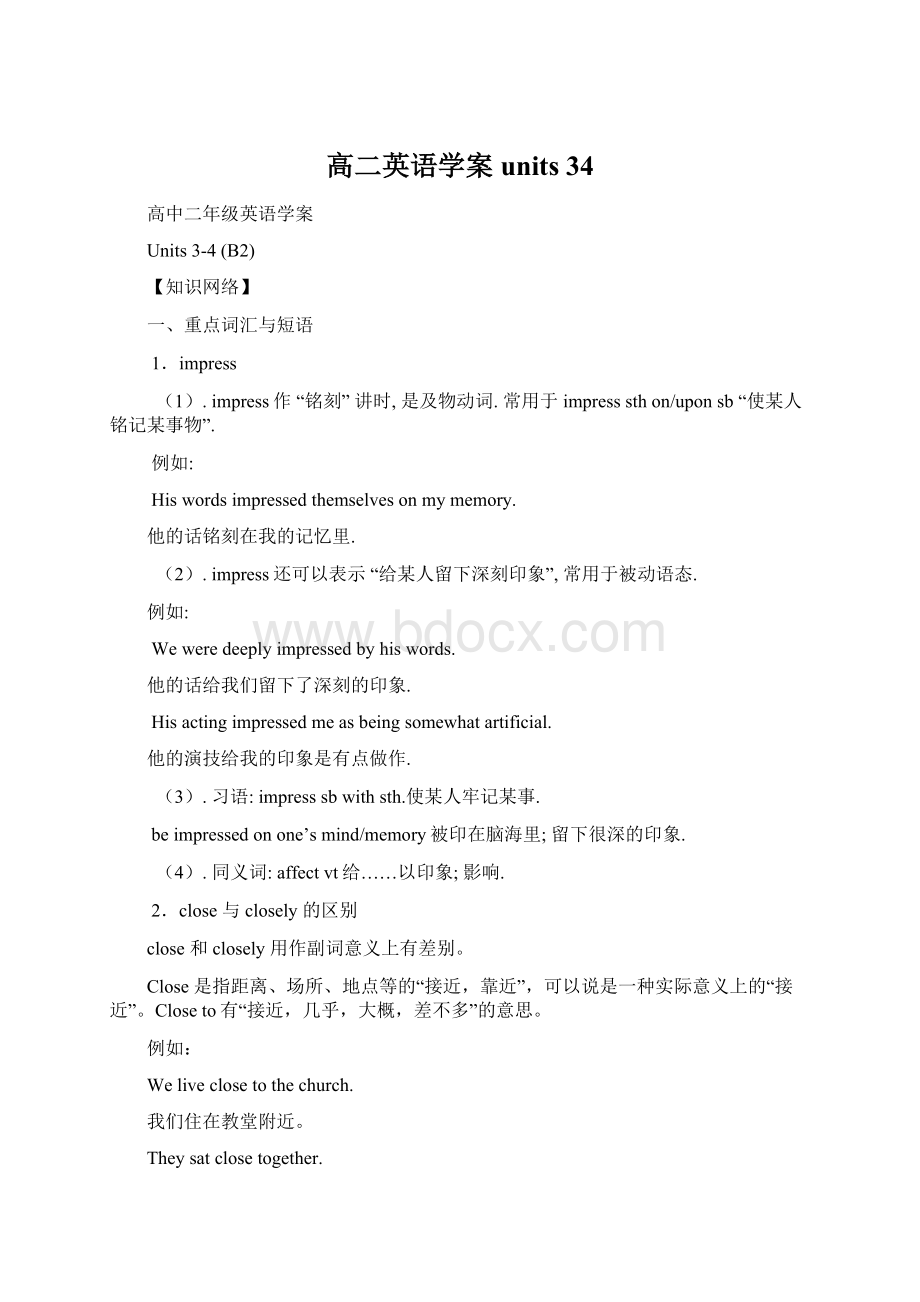高二英语学案units 34.docx
《高二英语学案units 34.docx》由会员分享,可在线阅读,更多相关《高二英语学案units 34.docx(13页珍藏版)》请在冰豆网上搜索。

高二英语学案units34
高中二年级英语学案
Units3-4(B2)
【知识网络】
一、重点词汇与短语
1.impress
(1).impress作“铭刻”讲时,是及物动词.常用于impresssthon/uponsb“使某人铭记某事物”.
例如:
Hiswordsimpressedthemselvesonmymemory.
他的话铭刻在我的记忆里.
(2).impress还可以表示“给某人留下深刻印象”,常用于被动语态.
例如:
Weweredeeplyimpressedbyhiswords.
他的话给我们留下了深刻的印象.
Hisactingimpressedmeasbeingsomewhatartificial.
他的演技给我的印象是有点做作.
(3).习语:
impresssbwithsth.使某人牢记某事.
beimpressedonone’smind/memory被印在脑海里;留下很深的印象.
(4).同义词:
affectvt给……以印象;影响.
2.close与closely的区别
close和closely用作副词意义上有差别。
Close是指距离、场所、地点等的“接近,靠近”,可以说是一种实际意义上的“接近”。
Closeto有“接近,几乎,大概,差不多”的意思。
例如:
Weliveclosetothechurch.
我们住在教堂附近。
Theysatclosetogether.
他们紧挨着坐在一起。
Hecameclosetolosinghistemper.
他差一点发脾气了。
Closely是指抽象意义上的“接近”,多用比喻意义,有“亲密地,严密地,仔细地”等意思。
例如:
Thesecretmustbecloselyguarded.
这个秘密要严加保守。
Heislookingatthebillclosely.
他正仔细地看着帐单。
[拓展]由close和closely这种意义上的区别,我们可以很轻松地区别high和highly、wide和widely等一类词。
带-ly的副词往往用作抽象意义或比喻意义,而不带-ly的副词多用作实际意义。
例如:
Hethrewtheballhighintotheair.
他把球高高地抛向空中。
(high是指实际意义上的“高”)
Theyspokehighlyofhisbehaviour.
他们高度地赞扬了他的行为。
(highly用作比喻意义“高度地”)
Thedentistaskedmetoopenwide.
牙医要我张大嘴巴。
(wide是指实际意义的“大、阔”)
Heiswidelyread.
他博览群书。
(widely是指抽象意义上的“广泛地”)
3.recommend
(1).recommend作“推荐;介绍”解时,是及物动词.与to搭配,表示“将……推荐给……”,与for搭配,表示“推荐……做……”,与as搭配,表示“推荐……为……”.
例如:
Icanrecommendthisdish.
我可以推荐这道菜.
Willyourecommendagooddictionarytome?
你能推荐(介绍)一本好字典给我吗?
Hewillrecommendyouforthejob.
他将会推荐你担任那项职务.
Irecommendherasyoursecretary.
我推荐她当你的秘书
(2).recommend表示“建议;劝告”讲,可以用于以下结构:
recommenddoingsth指“建议/劝告做某事”:
recommendsbtodo,指“劝某人做某事”:
recommend后还可加that从句,表示“建议……”.
例如:
Irecommendgoingbyairplane
我建议搭飞机去.
Thedoctorrecommendedmetotakealongrest
医生劝我长期修养.
Herecommendedthattheprisoners(should)bereleased.
他建议释放俘虏.
[注意]recommend引导宾语从句时,从句动词需要用虚拟语气形式,即“should+do”或者do.
(3).同义词:
advise/suggestvt.建议.
二、词义辨析
1.如何正确使用“offer,provide,supply”?
offer指主动提供。
常构成“offersb.sth.;offersth.to/forsb.”结构。
provide提供,供应,供给(有用的或必需的物品)。
常构成固定结构“providesth.(forsb.;providesb.withsth.”。
supply供应,供给(所需要或所要求的物品)。
常构成固定表达“supplysth.tosb.;supplysb.withsth.”。
[例如]
Thepoliceareofferingabigrewardforanyinformationaboutthemurder.
警方悬赏一大笔赏金给提供有关这一谋杀案情况的人。
Thefirmhasprovidedmewithacar.
公司提供给我一辆车。
Theysupplygastoconsumers.
他们向消费者供应煤气。
2.although,though,as,inspiteof和despite的区别
这几个词都有“虽然,尽管”的意思.前三个词是连词.而inspiteof和despite是介词.
(1).although和though是从属连词,though更为常用,而although则更为正式一些.although和though引导的句子既可以放在主句前,也可以放在主句后面.两者在句中经常可以互换.
例如:
Although(though)heisalittlechild,heknowsalot.
[注意]although和though引导的句子不能与but和however连用.
例如:
(误)Althoughheisrich,butheisnothappy.
(正)Althoughheisrich,heisnothappy.
(2).though引导的从句还可以用倒装语序,即把句子中的表语,状语提前放到句首.而as引导的让步状语从句则必须把句子中的表语,状语提前放到句首.两者可以互换.
例如:
Tiredthough(as)hewas,hewasstillworkinghard.
[注意]如果表语是单数名词,提到句首时需要去掉冠词a..
例如:
Childthough(as)heis,heknowsalotofknowledge.
(3).inspiteof和despite是介词,后面接名词或代词.
例如:
Hekeepsworkinginspiteof(despite)hisillness.
他不顾有病,坚持工作.
Inspiteof(Despite)allthisdiscomforts,theCuriesworkedon.
居里夫妇不顾一切困难,继续工作着.
4.不同的“表达”:
illustrate,suggest,express
1.illustrate(以实物、例子、图解)说明,例证,阐明。
例如:
Thebookwasillustratedwithcolorphotographs.
这本书配上了彩色照片。
Explainandillustratethemainuseofthepresentperfecttense.
解释并举例说明现在完成时态的用法。
2.suggest暗示,间接表明。
例如:
Thatgirl’ssun-burnedfacesuggestsexcellenthealth.
那个姑娘被太阳晒黑了的脸表明她身体非常健康。
3.express(用语言、外表、动作)表达,明显地表示。
例如:
HecanexpresshimselfingoodclearEnglishnowafterfouryears’hardlearning.
经过四年的艰苦学习,现在他能用清楚流畅的英语表达自己的意思了。
Asmileexpressedherjoyatthenews.
微笑表达了她对这个消息的喜悦心情。
三、重点句型
1.Besides,nomatterhowwelltranslated,somethingofthespiritoftheoriginalworkislost.另外,不管翻译得多好,也会丢掉原著中的某些精神.
nomatter后接疑问代词或疑问副词,引导让步状语从句,意为“不管……;无论……”.如:
Ifthatideawaswrong,theprojectisboundtofail,nomatterhowgoodalltheotherideasmightbe.
2.UsuallyrememberedforotherworkthantheirpoetryareeighteenthcenturypoetssuchasPopeandJohnson.不是因为诗,而是因其他杰作让人不能忘怀的还有18世纪的蒲柏和约翰逊等.
为了强调,此句的语序颠倒了.正常的语序是:
EighteenthcenturypoetssuchasPopeandJohnsonareusuallyrememberedforotherworkthantheirpoetry.
berememberedfor“因……被人怀念,纪念或尊敬”
Mr.Smithwillberememberedforhisgenerositytothepoor.
比一比
berememberedas
than此处意为“除……之外;除……以外”,常放在other,otherwise,else等词后.
如:
Ihavenootherfriendsthanyou.
otherthan[常用与否定句]除了:
除……之外
Youcan’tgettotheislandotherthanbyboat.
3.Viewedfromthetop,itlooksasifthestadiumiscoveredbyagraynetofsteelanditlooksjustlikeabird’snestmadeoftreebranches.从上面看,这座体育馆像是被一个灰色的钢筋网盖住了,它看上去就像一个用树枝垒起来的鸟巢.
Viewedfromthetop是过去分词作条件或时间状语,相当于Ifitisviewedfromthetop.如:
Usedeconomically,onetinwilllastforatleastsixweeks.
itlooksasif是常用句型,意为“看起来像……”.Asif从句中常用虚拟语气,但如果放在look,seem,taste,smell等动词后时,却常用陈述语气.
如:
Themilksmellsasifitissour.
四、语法复习
过去分词作复合宾语
在英语中,有些动词只带一个宾语,句子意思还很不完整,须另带一部分说明宾语的情况或状态,我们就把这一部分叫做宾语补足语,或复合宾语。
如:
Inthemorningpeopleworkupandfoundtheworldoutsidetheirhousescompletelychanged.
Manytownsandvillageshadtheirwatersupplycutoffbecausetherewasnoelectricity.
TherefamousparksinandaroundLondonhadover1,400treesblowndown.
过去分词作宾补小结:
1.后接过去分词作宾补的词:
(1)表感知的动词:
see,watch,find,observe,notice,hear,feel,taste,smell,etc.
如:
Iheardthesongsunginthenextroom.
HefoundhimselfinspiredbyJapaneseseashells
(2)表使役的动词:
have,make,getetc.
如:
Everygreatcultureinthepasthaditsownideasofbeautyexpressedinartandarchitecture.
Weshouldworkhardertogettheworkdoneontime.
(3)表想法、愿望的动词:
want,should,like,wouldlike,etc.
如:
Theywantedtheirbuildingsconstructedinawaytolookunnatural.
I’dlikeLucyinvested,too.
(4)表某种状态的词:
keep,leave,etc.
如:
Whenyouwereout,youshouldkeepthelightsturnedoff.
Itishadmannersifheleftthedoorbrokenafterhebrokeit.
2.过去分词作宾补与其他非谓语动词作宾补的区别:
(1)及物动词的过去分词作宾补时,表示被动,说明宾语是过去分词动作的承受者;而不定式,-ing形式作宾补时,表主动,说明宾语是补足语动作的执行者。
如:
Wehaveourclassroomcleanedeveryday.(classroom和clean之间是逻辑上的被动关系)
TheteacherwillhaveLucycleantheclassroomtoday.(Lucy和clean之间是逻辑上的主动关系)
(2)不及物动词作宾补时,表动作完成,说明分词的动作发生在谓语动词之前;不定式作宾补时,一般表示不定式的动作在谓语动词之后发生,但动词see,watch,notice,observe,hear,feel,smell,taste
后的不定式作宾补时(不定式的to省略),表示不定式的全过程;而-ing形式作宾补是、表示动作正在发生。
如:
WhenIgothome,Ifoundthenecklacegone.(“丢”这一动作已完成)
IheardJimsingthesong.(我听见唱的全过程)
WhenIgotthere,IsawMaryreadinganEnglishnovel.(“读”这一动作正在进行)
过去分词作状语
过去分词从表意的角度看可以用作状语,表时间、原因、条件、让步、方式或伴随情况等。
1.表时间
Viewedfromadistance,theislandlookslikeacloud.(=Whenitwasviewedfromadistance,…)
Oncepublished,hisworkbecamefamousfortheabsenceofrhymeattheendofeachline.(=Oncehisworkwaspublished,…)
2.表原因
Greatlydisappointed,somestaffdecidedtoleavethecompany
3.表条件
Givenmoretime,theslowlearnerswouldhavedonebetter.
Seenfromthetop,itlooksasifstadiumiscoveredbyagraynetofsteel.
4.表方式或伴随
Hewalkedupanddown,lostinthought.
Surroundedbyahostoffans,themoviestarlefttheairportexcited.
除了直接修饰动词之外,过去分词或短语也可以和连词组成短语,表示以上四种意思:
1.由when,while,whenever,until等连词引导,表示“时间”。
如:
When(heis)askedaboutthesecretofhissuccess,heowesmuchofhissuccessandhappinesstohiswifeandchildren.
Lucyseldomspeaksinclassuntil(sheis)spokento.
2.由where,wherever连词引导,表示“地点”。
如:
Retireesingoodhealthshouldbeinvitedtoreturntoworkwherever(theyare)needed.
3.由if,unless引导,表示“条件”。
如:
If(theyare)keptfortoolong,somemedicinewilllosetheireffectiveness.
Unless(itis)changed,thelawwillmakelifedifficultforfarmers.
4.由though,although,eventhough连词引导,表示“让步”。
如:
Although(itwas)builtbeforethewar,theengineisstillinperfectorder.
Eventhough(weare)defeatedforasecondtime,ourteamdidnotgiveuphopefortheultimatevictory,
此外,过去分词还可以和介词with,without连用,具有副词的作用。
如:
Withoutanythingleftinthekitchen,theydecidedtoeatoutside.
最后,过去分词有时可以有其独立的主语,二者构成一种分词独立主格结构
如:
Alloursavingsgone,westartedtolookforjobs.
Thisdone,wewenthome.
【考点透视考例精析】
[考例1]Luckily,we’dbroughtaroadmapwithout______wecouldhavelostourway.
A.itB.thatC.thisD.which
[点拨]选D。
本题考查“介词+关系代词”引导的定语从句。
解此题的关键是判断前后两个简单句之间是主从关系还是并列关系。
[考例2]Sometimesyoumay________givingupsomething,butyouneedn’tworryaboutit.Youmusthaveconfidenceinyourself.
A.wanttoB.wouldliketoC.feellikeD.decideto
[答案]C
[解析]本题的选项A,B,C都可以表示“想要干什么”。
但wantto后面要接dosth.,即动词原形;wouldliketo后面也要接动词原形;只有feellike后才可以接doing。
D项的decideto后也接动词原形,表示“决定干…”。
[考点]考查动词-ing形式作定语的用法。
[考例3]There was a terrible noise ___ the sudden burst of light.
A.followed B.following
C.to be followed D.being followed
[答案]B
[解析]本句主要考查动词的-ing形式与过去分词短语作定语的用法。
由于声音在闪电后,也就是说声跟随着光,意思应为主动的,所以此处用现在分词短语作noise的定语。
[拓展]表示主动和被动的问题是区分动词-ing形式和过去分词的一个要点。
一定要注意此点。
再如:
Theteachercameintotheclassroom,followedbyhisstudents.
Thestudentscameintotheclassroom,followingtheirteacher.
以上两个句子的基本意思是相同的,要注意他们中的“跟随”关系以及-ing形式与过去分词的用法区别。
【基础演练】
一、根据所给首字母或括号中的汉语意思填写句子空格中所缺的单词。
1.Inmy______(看法),sheisnotabletotakecareofthechild.
2.A______(化学的)changetakesplaceinpaperwhenitburns.
3.Thewholecitywas______(毁坏)intheearthquake.
4.Howbeautifulthemusic______(听起来)!
5.Thefishhaveverysharp